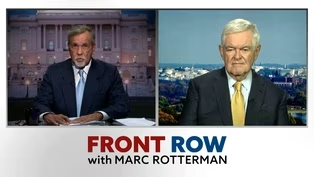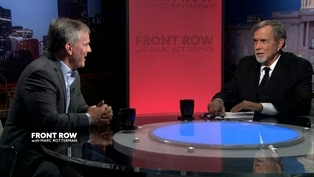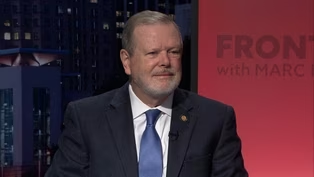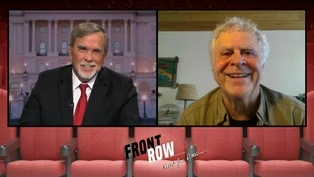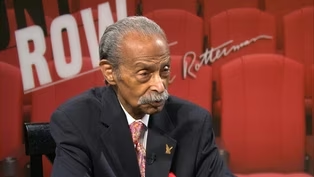
Holiday Special (2021)
Season 11 Episode 24 | 26m 46sVideo has Closed Captions
A long awaited reunion, Samaritan's Purse fills children's boxes & Habitat for Humanity.
This week on FRONT ROW with Marc Rotterman: Two childhood friends reunite after 82 years, Samaritan's Purse packs almost 3 million boxes for children at Christmas & the good works of Habitat for Humanity. On the panel this week: Mitch Kokai, Rep. Robert Reives, Jonah Kaplan, and Donna King.
Problems playing video? | Closed Captioning Feedback
Problems playing video? | Closed Captioning Feedback
Front Row with Marc Rotterman is a local public television program presented by PBS NC

Holiday Special (2021)
Season 11 Episode 24 | 26m 46sVideo has Closed Captions
This week on FRONT ROW with Marc Rotterman: Two childhood friends reunite after 82 years, Samaritan's Purse packs almost 3 million boxes for children at Christmas & the good works of Habitat for Humanity. On the panel this week: Mitch Kokai, Rep. Robert Reives, Jonah Kaplan, and Donna King.
Problems playing video? | Closed Captioning Feedback
How to Watch Front Row with Marc Rotterman
Front Row with Marc Rotterman is available to stream on pbs.org and the free PBS App, available on iPhone, Apple TV, Android TV, Android smartphones, Amazon Fire TV, Amazon Fire Tablet, Roku, Samsung Smart TV, and Vizio.
Providing Support for PBS.org
Learn Moreabout PBS online sponsorshipMore from This Collection
Explore this collection of special interviews from FRONT ROW with Marc Rotterman.
August 26, 2022 - FRONT ROW with Marc Rotterman
Video has Closed Captions
A conversation with former Speaker of the House Newt Gingrich (26m 46s)
A Conversation with NC Attorney General Josh Stein (2021)
Video has Closed Captions
A conversation with NC's Attorney General Josh Stein. (26m 46s)
A Conversation with Senator Phil Berger (2021)
Senate Leader Phil Berger discusses NC's budget, redistricting, and the Leandro case. (26m 46s)
A Conversation with Speaker Tim Moore & Sen. Dan Blue (2021)
Video has Closed Captions
A conversation with NC Speaker of the House Tim Moore and Sen. Dan Blue. (26m 46s)
A Conversation with Homer Hickam (2020)
Video has Closed Captions
Host Marc Rotterman has a conversation with Homer Hickam. (26m 46s)
A Conversation with Henry "Mickey" Michaux (2019)
Video has Closed Captions
Henry "Mickey" Michaux joins host Marc Rotterman for an exclusive interview. (26m 46s)
Providing Support for PBS.org
Learn Moreabout PBS online sponsorship- Hi, I'm Marc Rotterman.
Coming up, two childhood friends reunite after 82 years.
Samaritan's purse packs almost 3 million boxes for kids at Christmas, and the good works of Habitat for Humanity.
Next.
- [Announcer] Major funding for Front Row was provided by Robert L. Luddy.
Additional funding provided by Patricia and Koo Yuen through the Yuen Foundation, committed to bridging cultural differences in our communities and by... Funding for the lightening round is provided by NC Realtors, Helen Laughery, Mary Louise, and John Burress, Rifenburg Construction, Stefan Gleason and Jane and Van Hipp.
A complete list of funders can be found at PBSNC.org/frontrow.
[piano music] - Welcome back.
Joining the conversation, Mitch Kokai with the John Locke foundation, Robert Reives, the democratic leader in the house, Jonah Kaplan with ABC news 11 and Donna King, editor in chief of Carolina Journal.
Jonah, let's begin with the story of two childhood friends recently reunited.
- What I love about this season, and even though I don't celebrate Christmas, I do embrace the Christmas spirit and I love the festivities around the holidays.
And, I love the universal principles and celebration of family and togetherness and lifelong friendships and renewal, the spirit of renewal.
And, that was apparent in this magnificent story of hope.
Two childhood friends, age nine in 1939 Germany, they said goodbye to each other.
They were two Jewish friends who went to school and because of the Nazi rise to power- - [Marc Rotterman] The Holocaust.
Yeah, the Holocaust right before their parents decided to flee Germany.
They didn't know where they were going.
They were nine years old.
They didn't know what was at stake.
One family went to Shanghai, China.
Another family went to Chile.
Now these two friends, their names were Betty and Anne Marie.
They didn't know where each other was going.
And in fact, for 80 years they thought maybe the other one perished was murdered along with the other 6 million Jews in that Holocaust.
There's something called the USC Shoah Foundation, Shoah being the Hebrew term for the Holocaust.
And, this is something that's sponsored and created by Steven Spielberg.
And, they are recording the testimonies of survivors while they can.
And of course, we all know you can defeat Hitler, but you're never going to defeat time.
And there was an indexer.
They was someone who was watching all these testimonies and said, "Wait a minute.
Something about these two stories kind of rings true, or there's something very similar."
And, it turns out they put these two survivors in touch and it was these two friends.
So, first during the pandemic- - [Marc Rotterman] Right.
- They met on Zoom.
They had a couple of conversations, and then once things calmed down, they got their vaccines, and they also said to themselves, "Hitler, couldn't get us.
We're not going to let a vaccine get us."
So, they met up in Tampa.
In a matter of a day, they said, they were attached at the hip.
And, after 82 years, they're now 91.
It was just, how can you not believe in miracles when you hear about something like that?
- Donna, what struck you about this story?
- Well, I think the work that the Shoah Foundation is doing is really what got me, because they're making sure that these stories are recorded because we're not too long, where there won't be many Holocaust survivors left among us.
And, knowing that their stories are out there, they're a part of history that they're documented with video and stories and all of that's really important to making sure that the next generation hears it firsthand from those who survived such a horrific part of our history.
And, it's also so the next generation knows to be watching and be paying attention to what's happening on happening in the world with Uyghurs in China and some of these other things that we're really hearing about now, I think it's important that what the Shoah foundation is doing gives hope and continues telling their story.
- Robert.
- The power of relationships.
It's just the thought that somebody that could have developed a friendship at nine years old, and it'd be so powerful that when they saw each other again- - [Marc Rotterman] That's a great point.
- 82 years later, that it still hold that same strength and think of the comfort that it gave them.
- [Marc Rotterman] Mitch?
- How great is it that the people who were working on this at the Shoah Foundation who were probably going through tons of stories, noticed that these two stories were so similar and put these people- - [Jonah] Like 120,000.
- Yeah, I mean, they're looking at all of these stories, they see these two that are so similar and say, "Huh, maybe these folks are related."
Cause you easily could have said, I've got a ton of work.
This is important stuff, but not see these similarities, and that story would not have happened if the folks putting these testimonies together, hadn't noticed it.
- That's just something.
About 40 seconds left.
- Well, these testimonies are now going to be part of North Carolina curriculum because let's point out that in the budget that was passed last month by the North Carolina General Assembly is the Gizella Abramson Holocaust Education Act.
And that mandates Holocaust education in North Carolina public schools.
There's already a Holocaust committee that's part of the NC Department of Public Instruction.
And, with the number of survivors dwindling, these are the witness statements that are going to endure.
And now it's going to be law here in North Carolina.
And, I'm very proud of that.
- Great conversation.
Donna, let's talk about Samaritan's Purse.
They're doing great work this year.
- Amazing work, like they do every year for the last 50 years.
A lot of us have filled a shoe box and donated it.
And, sometimes you don't always know where it goes, but I'll tell you where it goes.
Where a lot of them go is to a processing center in Charlotte.
There about 40,000 volunteers are gonna process 3 million shoe boxes.
These shoe boxes go all over the world.
In many cases, they are a child's first, only Christmas gift, their first contact with Christianity.
And, that's something that's Samaritan's Purse does throughout the year, not just at Christmas.
They work really hard, making sure that people have clean water.
They help, you know, spread their faith, spread Christianity throughout the world.
And, one of the things they're working on right now is helping Afghan translators, Afghan refugees settle into a new life.
They take this charge on a year round.
And, it's something that a lot of folks even see as a Christmas gift.
When they go on their website, they can give in the name of a loved one.
And, these Samaritan's Purse boxes, toiletries, and little toys, and those things really take love and the Christmas spirit around the globe.
- Jonah, they're also very involved in the Mid-East with refugees.
- Well, and look, when we think about Afghanistan, we remember the images as we wrap up the year of the flights out of Afghanistan.
We haven't really heard a lot about what happened next.
And, there's a North Carolina connection to this because there are airmen and air women from Seymour Johnson Air Force Base who are working at these various army posts, and Marine camps in different places in this one in particular, which is at Camp Liberty in Fort McGuire, Joint Base McGuire-Dix-Lakehurst in New Jersey.
There's about 11,000 Afghan refugees there.
And, look, there are Syrian refugees.
There are from Burma, Myanmar.
I mean, when we think about refugees- - Samaritan's Purse goes right up into the war zone to help these refugees.
- And, they need it.
And, that's also, I mean, the universal aspect of these holidays reminds us of the commonality among us as humans.
And, even if there's a language barrier, we still cherish our families.
We still cherish our faith, and we still need the simple pleasures of life to survive.
- Mitch?
- This reminds me of course, about the power of civil society.
Governments can and do many important things, but you also need people who are acting outside of the context of the public sector to be doing the types of things that Samaritan's purse does.
And, because the United States is such a successful country, you have people who are willing to give to charities, not just Samaritan's Purse, but groups of all types of all faiths that are willing to put forward this effort.
That is something that we should take comfort in.
- Robert, my friend.
- Yeah, what hits me about the whole story is the fundamental message that it gives about love.
And, I don't think that that can, and it really kind of goes to what you're saying, Mitch, in the sense of the power of people reaching out.
You know, not being forced by government, not being told what they've got to do, but people just reaching out and just saying, "I don't care what your story is, what your situation is.
I love you.
Here's something I want to do to help you."
And what that will mean is that will make an indelible mark on whoever is affected by that.
And, I mean that one interaction is going to change lives.
- That's a really good point, because there's 40,000 volunteers helping them with this, Donna.
- Absolutely.
There are Christians and volunteers putting their hand on that box, praying over it, filling it with things that that folks need all over the world.
And, one of the things, that's a really important thing that I didn't bring up the first time around.
This is a North Carolina group.
You know, they're headquartered in Boone.
So, these are North Carolinians that are packing these boxes, that are putting their heart and soul into this giving process year round, not just at Christmas time.
- Jonah, any final thoughts?
- Well, and there's so many other great North Carolina organizations.
I was at a place called Rise Against Hunger in their warehouse in Raleigh, and they were sending shipments to civil war torn areas like Haiti and Nicaragua and other places.
And, because of the internet, let's celebrate it.
You're able to find out about all these places, go to the resources, you know, check out the Red Cross and this other great organization.
I mean, there are ways for you to give and fill your soul while also filling the hearts and stomachs potentially of people in need.
- Okay, Robert, you brought a good story to my attention.
That's Chatham County's Habitat for Humanity.
Talk to us about that.
- Yeah.
And, it's really interesting, because I remember my very first interaction with Habitat for Humanity was when I was growing up, my fourth grade teacher, Ms. Hopson, and I never knew what it was.
And, I just knew that she was nice, and she's doing something nice and that's it.
So, push this forward to the first time I'm running and the first year I'm running for elections, 2014.
And, one of the folks I got a chance to work with was a lady named Becky Loughlin.
And, you know, the first thing she said was like, "We're doing this Habitat for Humanity.
You know, want you to see it.
Want you see what's going on."
And, it's an amazing thing that they've done in Chatham.
When you think of growth, the first thing you think are all the positives.
You know, all the things that are gonna come whenever we've got people coming to the county.
And, I know you guys in Wake County know what I'm talking about.
And, you think of that, but you don't think of what the other part of it.
And, that is that the most valuable thing that people care about in their life journey beyond their family and their faith is a home.
And, how a simple pleasure like that, we can sometimes take for granted.
And, Habitat for Humanity builds these homes.
And, they've got tons of volunteers.
Jerry Wharton now runs it, is the executive director in Chatham County.
And, it becomes a real project.
They get local contractors, you know, local, you know, regular folk that never built a house before working on building these houses.
And then, they do a huge presentation to the families and these family, you've never seen joy like you do on the faces of these families when they get these homes.
And you know, and it's something that they've helped build, they've helped produce.
And it just means the world.
And, just when you see people giving them their time, effort, money, cause again, this is a, you know, not for-profit any type of situation.
This is something where people are doing this, and they're doing this all of the time.
The Chatham County Habitat for Humanity, may be the busiest that I've seen, and they really do some great work.
- Mitch, I'd be remiss if I didn't talk about Jimmy Carter's work in this area.
- I mean, he started it.
So, Habitat for Humanity was really his brain child.
He got it going.
The best Habitat for Humanity story I've ever heard came out of the tragedy that was Hurricane Andrew, that swept through Florida, knocked out all kinds of structures.
And, I remember distinctly hearing a report from someone saying that they would go through neighborhoods or sections of the city, and the only buildings that were still standing were the Habitat for Humanity homes, because they're built so well.
The people go in, and they aren't just building to barely meet code.
They're, all those people are volunteering.
They're putting in their love, their time.
And, the people who get the Habitat for Humanity homes have to have done some work.
They don't just give them to people.
They have to have done something to qualify for it as well.
- Donna, there's other groups like this for vets too.
Tunnels for Towers that helps build houses for vets that have lost their lives, their families.
- There are, and I think that that speaks to exactly what Mitch said early.
This is about, you know, in many cases, private charities picking up the hammer, picking up the mantle, moving on and helping those in their community.
But, one of the important things I think is about Habitat for Humanity is it's not about giving people free houses.
This, they have to save the money for closing costs.
They have to make a mortgage payment.
They are taking the value of the house and it's a 0%, 20 or 30 year mortgage.
And, they take into consideration the homeowners income when they establish what that mortgage will be.
They have to put in sweat equity.
You know, 300, 500 hours of sweat equity on their own home on other's homes.
So, this is a real investment by the homeowners, not just the volunteers.
- Jonah.
- As we move in to 2022, you know, when we think about public private partnerships, Habitat for Humanity, I hope challenges and raises the standards for government to come up with some creative ideas and solutions for the affordable housing crisis.
And, how do we teach people, Not really just teach them, but empower them to make better decisions for their families?
When you are, are given this opportunity to purchase a home, I mean, it empowers a family to take control of their lives.
It teaches them about fiscal responsibility.
It also enables a child.
I mean, what did we learn in the pandemic about the stability of a home life?
How that could give so much more for intellectual growth and be able to do well in school and then a healthy diet and all of these things.
They are all connected.
And, how do we bridge the gap between marginalized communities and those who are privileged?
This is how it starts.
And again, credit to the ingenuity of Habitat for Humanity.
And you know, it's.. you're on man.
[all laugh] - Anyway, I want to move on, because there's a great story about a North Carolina sailor coming home who was killed at Pearl Harbor, finally coming home to Albemarle, I think in March.
- We're talking about Navy Seaman First Class Edward E. Talbert, who was assigned to the USS Oklahoma, which was at Ford Island in Pearl Harbor when the Japanese forces attacked 80 years ago, December 7th, 1941.
429 crewman on that particular ship among the other ships as well were killed, including Talbert.
His remains, along with the rest of the remains were buried at the time.
They were disinterred in 1947 with the attempt to try to identify some of these people so that families could get some closure.
But, at the time only 35 of the 430 people were able to be identified.
And so, the rest of the remains were buried and called the unidentified.
But, some years later in the timeframe of 2015 or so, something called the Defense POW Mia Accounting Agency went back, looked through the remains, used some more up-to-date methods to try to identify some of the remains.
And, one of the people that they were able to identify as being part of the unidentified remains was Navy Seaman First Class Edward E Talbert.
He's going to be returned to his hometown of Albemarle and will be buried on March 26th.
- Donna, do you think the generations today appreciate what the greatest generation did?
Do kids today appreciate -- - I think it's our responsibility to make sure they do.
I think that this story really speaks to who we are as Americans, that we are committed to life.
We're committed to each other.
We're committed to our history.
If you look at what technology has brought us now, there will not be another unidentified soldier, because we have the technology to be able to identify those who made the ultimate sacrifice.
And, I think that that is something powerful.
I think that also, we only have about 1%, half a percent of the population, because we got rid of the draft in the seventies that even serves in the military.
And, when you're talking about less than 1% of our communities, our adult community serves in the military, that means it's incumbent upon the rest of us to make sure that our children and future generations appreciate the sacrifice of the greatest generation, and all of those who've served after.
- You know, we're losing about a thousand of the greatest generation a day, Jonah.
- Again, I bring back that point where you can defeat Hitler.
You can defeat the axis powers.
You're not going to defeat time.
And, that's just a sobering fact of life.
And, I think the challenge for us, for younger generations who like, I mean, I'm on the older side of millennials, and I've kind of bridged that gap.
My grandfather was a World War II veteran.
My wife's family, her grandfather was a Holocaust survivor from Austria.
How do we communicate these stories?
But, how do we also instill within our children that same identity and responsibility?
And, that notion that we are part of a collective community?
We're in this, I-generation, the iPod, the iPad, the headphones on, we're always watching, I mean, we're kind of internalized.
- [Marc Rotterman] Not much we.
- It's my team.
It's my, this, it's my thought.
You know, it's my vaccine.
- [Marc Rotterman] Right.
- It's my body, it's this.
But, when does it become this collective idea that we're all in this together, and we're all in this as Americans?
And, when it's such a inter woven global community too, how do we build an identity and one that respects everyone, but also finds commonalities?
- Robert?
- One of the things that I think are important that everybody's already talked about is that you've got to talk about history.
You've got to talk about what happened.
And, I think that there's nothing better than to be able to get it from the people who talked it, who lived it.
I know one of the great experiences I've had being in the General Assembly is when they bring back the WWII veterans.
And, when you see them up there, there's every race, nationality, background, religion, and they look like those 90 plus year old folks, soldiers, they look like school kids when they get back together again, because they're so happy to see each other.
And we've, it's just like you said, it's incumbent upon us to make sure that people understand what the sacrifice actually was.
Cause it's one thing to hear, well, there was a war.
People went and fought and that's it, but when you really get in depth stories of an 18 year old- - [Marc Rotterman] Right.
- That's never been outside of the city, much less outside of the country, that means something.
- Let's talk about some inspiring stories this week.
- This is a sad story that ends up having a happy end.
There was a fellow from the triangle named Joseph Moss, and last July, he was diagnosed with Lyme disease.
That was in July.
And then, a couple of months later, he ended up getting COVID and pneumonia.
And, he had such bad lung damage, he had to get a double lung transplant.
That was successfully done in October, but shortly afterward, he suffered a setback and had irreversible brain damage.
But, that's the sad part of the story.
The part that's going to be uplifting is that he will end up now being an organ donor for three other people.
His wife and daughter were called it a miracle.
I mean, they're sad to lose the father and the husband, but they're happy that three other people can live because of him.
And, the other caveat is the daughter has been living for seven years since getting a heart transplant of our own at Duke.
- Wow, Robert.
- There's a new stem cell treatment that looks like it's cured a man of diabetes one.
And I think diabetes one is forgotten diseases because it's not immediately fatal.
It causes all these other things that make you become fatal.
And so, this family had gotten into a trial, and then they found out that the diabetes is going into remission.
And so, we're hoping that the stem cell research will really help people with that disease.
- Great catch.
- Jonah?
- Gabby Giffords, who is the former Arizona Congresswoman who was shot- - [Marc Rotterman] While campaigning.
- And, injured while campaigning, she just had her bat mitzvah at age 51.
And, that is a Jewish ceremony that normally, if you're a girl it's 12 years old, if you're a boy 13, you have a bar mitzvah.
It just shows you that really at any age, though, you can embrace your faith, your identity, and you can learn something new.
And so mazel tov, Gabby.
- Donna.
- I thought this one was really interesting.
Hopefully we're all getting chewing gum in our stockings, but maybe not any gum.
So, the University of Pennsylvania has developed a chewing gum that they say can trap and kill the COVID virus in saliva.
Now, one of the interesting things about this is that it's cheap to make.
If it works out, it's cheap to make and they can mass distribute it in areas of the world where treatments are less effective, and some of the more modern medicine that we enjoy here, aren't as readily available.
So chewing gum, who would have thought?
- How far along are they?
- They're still in the very beginning stages.
They're starting human trials on it, but they say that it's early, but promising.
- Well, I see with COVID and it was an Omicron.
Now, they're not sure that they're going to need a vaccine for this.
Have you heard that?
- I have heard that.
I think that they're learning more and more about it every day.
And, it seems to not be as dangerous as the Delta variant that we've heard a lot about over the summer.
But, they're, you know, more information is coming out all the time.
- Well, I think we're learning to live with it.
Don't you?
- I think Hershey would get involved.
[all laugh] That would make it a lot more appealing I think for a lot of people.
[all laugh] We just pray this holiday, just everyone is healthy and well, and may we all have only good news in the new year.
- Okay.
Who's been naughty in nice this year, Mitch?
- My naughty list is those organized bands of smash and grab robbers.
I mean, they're, you could talk about many reasons for this, maybe public policy, but whatever the reason, these folks have been causing all kinds of havoc, especially in cities like San Francisco.
And during this time, when people are shuffling to try to get their gifts, we don't want to see those organized bands of robbers.
My nice, this is a nice honor for two basketball legends.
Now we know we're Tarheels, but we know that the people on the board of transportation are not all UNC grads.
Despite that, they voted unanimously to rename seven miles of Interstate 40 after Roy Williams and Dean Smith, two of the all-time great basketball coaches.
- Robert?
- Well on naughty list, I think some folks would say oil companies.
While we've been struggling with high gas prices, oil companies have had record profits this year.
And so, they say it's not our fault, but I think some people would say that it is, but on the nice list, have I mentioned Toyota?
[all laugh] Toyota.
- You're on message.
How many jobs?
How many jobs are going to create?
- 1750 jobs out the gate.
And then, what we're hoping obviously is what that does to the rest of the area, and it spans out exponentially.
- Jonah?
- Yeah, weeks later, it's still a big deal for us.
Who's on the naughty list.
Well, I'll give this guy an A for effort.
So, in Italy they also have vaccine requirements, especially for physicians and dentists and nurses and all things.
So, there was a dentist who went and got his vaccine, or so they thought.
He came with a fake arm made of silicone.
- So, he's a real anti-vaxxer.
- [Donna] Why go?
- Whatever.
Anyway, he was caught.
He faces federal charges, and now he claims he actually got his vaccine in his real arm.
But, like dude, if you're going through that much effort, just get the thing, whatever.
Anyway, and who's nice?
So we're taping this on a Friday, Tomorrow Christmas, Mary Brown is a Raleigh woman.
She has teamed up with a number of restaurants in Raleigh and every year it does this great thing in City Plaza where they collect clothing and coats, and they make a huge meal from all the restaurants, for the homeless and the invisible homeless, those who live in hotels, and that is finally back after the pandemic.
And, they tried to collect backpacks last year over the summer.
And so, if you're around, and you're watching this and you want to go to City Plaza tomorrow in downtown Raleigh, what a phenomenal event.
- Donna?
- Amazing.
Okay.
So my naughty list, I'm going to say companies who have trashed the traditional Christmas party.
So, I'm hearing more and more big companies who have stopped their Christmas party tradition.
HR groups say that they're really seeing it more in small companies, but only 11.5, 11.3% of employed Americans are still working remotely after the pandemic.
So, it's less common than I thought.
So, that Christmas party needs to come on back.
- Okay.
- On my nice list is Trees for Troops.
Lots of North Carolina tree farmers are sending free trees through Trees for Troops to North Carolina military installations so that those soldiers can have a beautiful tree.
- And they put wreaths up in Arlington in Arlington Cemetery on all the graves too.
- They do.
- Mitch.
What's your New Year's wish?
- In a highly charged political year, I'm hoping that the debates are going to be on contrasting visions and viewpoints, not personal attacks, and that our elections will end with clear uncontested results, whatever they are.
- Don't watch cable TV.
New Year's wish?
- I'm hoping our elections will end on fair legislative maps.
- New Year's wish?
- Civility, decency, perspective.
- [Marc Rotterman] Okay.
New Year's wish.
- My new year's wish is that all of North Carolina's public school students can finish the year in person with all of the things that we come to expect from schools, circle time, football games, school dances, all of that.
- Are we getting close to that?
- I don't know.
I think in some areas we are, and you know, everybody's watching the numbers very closely.
- Okay.
That's it for us.
Great job panel.
Have a Merry Christmas.
See you next week on Front Row.
[piano music] - [Announcer] Major funding for Front Row is provided by Robert L Luddy.
Additional funding provided by Patricia and Koo Yuen through the Yuen Foundation, committed to bridging cultural differences in our communities, and by... Funding for the lightning round is provided by NC Realtors, Helen Laughery, Marie Louise and John Burress, Rifenburg Construction, Stefan Gleason and Jane and Van Hipp.
A complete list of funders can be found at PBSNC.org/frontrow.
[piano music]

- News and Public Affairs

Top journalists deliver compelling original analysis of the hour's headlines.

- News and Public Affairs

FRONTLINE is investigative journalism that questions, explains and changes our world.












Support for PBS provided by:
Front Row with Marc Rotterman is a local public television program presented by PBS NC
